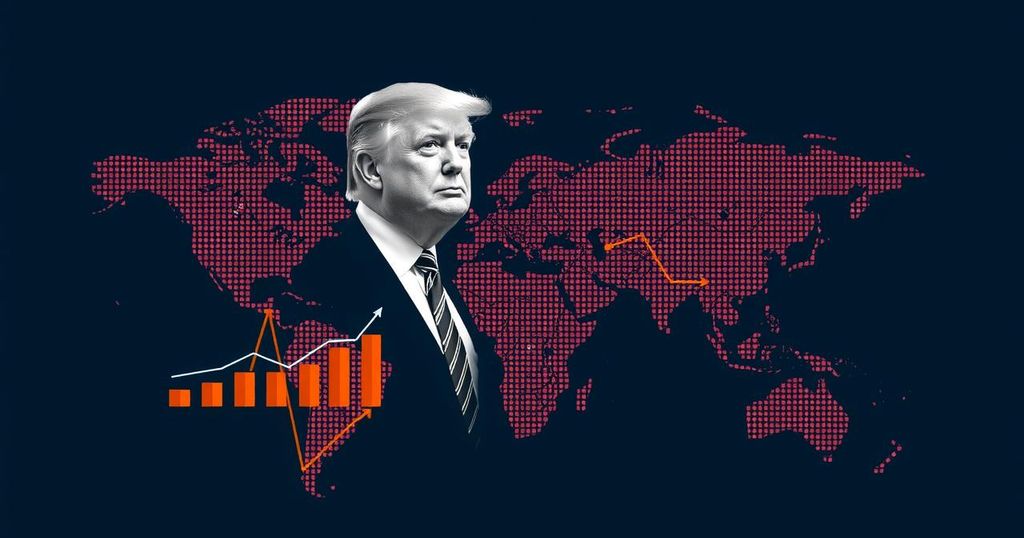Donald Trump’s probable presidency may reshape the global economy through protective tariffs and an inward-focused industrial policy. While the U.S. continues to pursue technological dominance, nations must mitigate their dependency and explore cooperative strategies. Challenges surface as China and Europe respond to U.S. actions, highlighting the need for diplomatic engagement and sustainable energy solutions amid rising global crises.
Donald Trump’s anticipated return to the presidency and his inclination to impose tariffs on all imports strike at the heart of a significant dilemma for the global economy. The United States stands as a formidable force in technological innovation, leading worldwide expenditures in research and development while accruing more Nobel Prizes than any other nation in recent years. This situation highlights a pressing need for the global community to mitigate its dependency on American technological advancements and innovation. Trump’s “America First” policy accurately reflects a bipartisan trend, deeply rooted in prior administrations’ efforts to reduce reliance on foreign manufacturing and prioritize domestic industry. During his earlier tenure, Trump’s administration accepted higher consumer prices as a trade-off for safeguarding U.S. producers through sweeping tariffs on international partners. For example, his 2018 tariffs on washing machines resulted in a 12% increase in costs for U.S. consumers. President Joe Biden has continued this protective approach, albeit more diplomatically, with significant tariffs on imports such as electric vehicles and solar cells. These developments occur during a time of escalating climate crises, wherein Biden’s decisions appear to intentionally decelerate the global energy transition to fortify American manufacturing interests. The Inflation Reduction Act and the CHIPS Act signify considerable governmental investments targeting electric vehicle production and semiconductor manufacturing, revealing the implications of American industrial policy for global markets. As the U.S. fortifies its industrial base, nations like China grapple with the challenges of overcapacity after years of export-driven growth. In response, China is pivoting towards bolstering domestic consumption and diversifying its trading relationships. Concurrently, Europe faces fiscal constraints yet invests heavily to compete with American subsidies, as demonstrated by Germany’s commitment to support its battery industry. This proliferation of subsidies threatens to worsen the international economic climate rather than address urgent global needs, such as enhancing energy access in developing regions. Such shifts have allowed China to assume a dominant role in investment across Africa, primarily driven by its resource acquisition strategies. The new administration may open avenues for fresh dialogue to address significant geopolitical issues, particularly healthily confronting energy dependencies established with Russia. Notably, Trump had previously cautioned Germany about reliance on Russian gas during his presidency, and this insight remains relevant as Europe pursues energy independence. Promising negotiation pathways can be explored, such as fostering cooperative relations with China in the technology sector while re-establishing Europe’s energy sovereignty. Given the contemporary human crisis marked by conflict and rising food insecurity, the international community faces a challenging landscape. The trajectory initiated by reduced U.S. interventionism under Trump may persist, rendering major advancements in global cooperation on peace and climate action less likely. In the face of these uncertainties, the global community must commit to refining cooperative efforts while recognizing the importance of independence across various domains. This paradigm shift may dictate the future of global relations as nations navigate an increasingly interdependent world economy.
The global economy faces substantial challenges in light of the shifting political landscape associated with Donald Trump’s potential second term as U.S. President. His approach to tariffs and national industrial policies could drastically reshape international trade dynamics, technological dependency, and energy security. The interplay between U.S. policies and those of other major economies, notably China and the European Union, underscores the complexities of a global economy striving for equilibrium amidst significant political and economic pressures. As these nations recalibrate their strategies in response to U.S. tariff policies and subsidy races, the implications for global markets and domestic consumers are profound. Diplomatic relations and cooperation in addressing climate change and trade liberalization are more critical than ever.
The potential re-election of Donald Trump signifies a turning point for global economic dynamics characterized by protectionist policies and intensified tariff imposition, endangering cooperation on international trade and climate action. Countries must strive for collaborative solutions to mitigate rising tensions and reevaluate dependency on dominant economies like the U.S. Additionally, there is an urgent need for global leaders to focus on impactful trade agreements and energy independence, alongside equitable distribution of technological advancements. In light of these developments, a unified approach is essential to tackle pressing global issues, ushering in a new era of cooperation that transcends mere economic competition.
Original Source: theconversation.com






